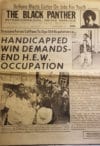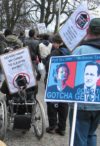Disability

The sick and disabled need true co-conspirators who hold politicians accountable, who value the sick and disabled as expert strategists speaking to the needs of the community; who understand and amplify our urgency and our anger. We need universal, single-payer health care—comprehensive care for all, regardless of income or health status—now. | more…

For many disabled people, the “abnormal” state of things over the last year and a half is not such an estranged discontinuity from the previous state of things. Certainly, just like everyone, pandemic life for disabled people has been exceedingly difficult, painful, oppressive, and deadly. But the “normal” of pre-pandemic life was also exceedingly difficult, painful, oppressive, and deadly. | more…

A historical-materialist analysis of the relationship between disability, the body, welfare, and capitalism is needed in order to further develop a Marxist understanding of disability. In this framework, we can see how the British welfare state, given recent changes to British disability policy, determines who is able-bodied and who is disabled, with this evaluation made in regard to the needs of monopoly capitalism. | more…
England, Wales, and the Socialist Vision
England and Wales represent two very different, indeed incompatible, approaches to health care. In the former, health care has come under increasing threat from the predatory forces of privatization. In Wales, however, an explicit effort has been made to defend socialist values and formulate them for the twenty-first century, defending and expanding a system that puts the health and well-being of its citizens over profit. | more…

In Acting Like It Matters, James McEnteer gives a compassionate account of John Malpede—actor, activist, and co-creator of the political theatre troupe the Los Angeles Poverty Department (LAPD)—and of the Skid Row community that is the organization’s heart and soul. The story of Malpede and the LAPD is one of life as art and art as life, and its protagonists are the dehumanized homeless citizens of Los Angeles and their compatriots in cities across the United States and the world, who represent a growing part of today’s global working class pushed out of the formal economy. | more…
Any human power can be resisted and changed by human beings.
—Ursula K. Le Guin
Le Guin is undoubtedly right about resistance in the “real” world, but in reading, only some books offer a call to resistance and the possibilities of a new reality. Among the books considered here, some come to us as “literary fiction”; others are marked as belonging to another, historically denigrated, form, “science fiction” or “fantasy.” This could be a distinction without a difference: two are near-future dystopian novels about corporate capitalism in the United States (both by well-established white authors); two are collections of near-future short stories that set out to critique the human powers that structure our world (written by both established and new voices, primarily writers of color). But the books that embrace rather than evade their status as science fiction or fantasy are the ones able to imagine the resistance and change that Le Guin invokes. | more…
In addition to old-age benefits, it is often forgotten that Social Security provides survivor and disability insurance protections as well. The privatization debate has overlooked the fate of Social Security Disability Insurance (SSDI) as a part of the program’s family of benefits | more…
I have a confession to make: I do not work. I am on SSI.1 I have very little work value (if any), and I am a drain on our country’s welfare system. I have another confession to make: I do not think this is wrong, and to be honest, I am very happy not working. Instead I spend the majority of my time doing the activity I find the most rewarding and valuable, painting | more…



